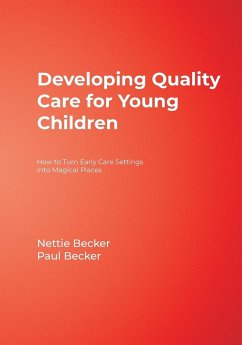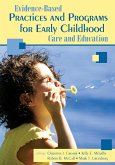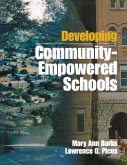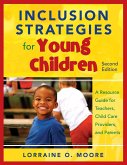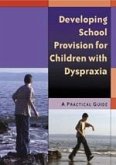Nettie Becker, Paul Becker
Developing Quality Care for Young Children
How to Turn Early Care Settings Into Magical Places
Nettie Becker, Paul Becker
Developing Quality Care for Young Children
How to Turn Early Care Settings Into Magical Places
- Broschiertes Buch
- Merkliste
- Auf die Merkliste
- Bewerten Bewerten
- Teilen
- Produkt teilen
- Produkterinnerung
- Produkterinnerung
Build a child care program that develops children's sense of wonder and joy for learning, incorporates cultural diversity as a teaching tool, and fosters healthy relationships.
Andere Kunden interessierten sich auch für
![A Quality Life A Quality Life]() Christine T. SeilerA Quality Life9,99 €
Christine T. SeilerA Quality Life9,99 €![Measurement Issues and Assessment for Teaching Quality Measurement Issues and Assessment for Teaching Quality]() Drew H. GitomerMeasurement Issues and Assessment for Teaching Quality179,99 €
Drew H. GitomerMeasurement Issues and Assessment for Teaching Quality179,99 €![Evidence-Based Practices and Programs for Early Childhood Care and Education Evidence-Based Practices and Programs for Early Childhood Care and Education]() Christina J. GroarkEvidence-Based Practices and Programs for Early Childhood Care and Education39,99 €
Christina J. GroarkEvidence-Based Practices and Programs for Early Childhood Care and Education39,99 €![Developing Community-Empowered Schools Developing Community-Empowered Schools]() Mary Ann BurkeDeveloping Community-Empowered Schools33,99 €
Mary Ann BurkeDeveloping Community-Empowered Schools33,99 €![Inclusion Strategies for Young Children Inclusion Strategies for Young Children]() Lorraine O. MooreInclusion Strategies for Young Children32,99 €
Lorraine O. MooreInclusion Strategies for Young Children32,99 €![Developing School Provision for Children with Dyspraxia Developing School Provision for Children with Dyspraxia]() Nichola JonesDeveloping School Provision for Children with Dyspraxia58,99 €
Nichola JonesDeveloping School Provision for Children with Dyspraxia58,99 €![Quality Instruction and Intervention for Elementary Educators Quality Instruction and Intervention for Elementary Educators]() Quality Instruction and Intervention for Elementary Educators45,99 €
Quality Instruction and Intervention for Elementary Educators45,99 €-
-
-
Build a child care program that develops children's sense of wonder and joy for learning, incorporates cultural diversity as a teaching tool, and fosters healthy relationships.
Hinweis: Dieser Artikel kann nur an eine deutsche Lieferadresse ausgeliefert werden.
Hinweis: Dieser Artikel kann nur an eine deutsche Lieferadresse ausgeliefert werden.
Produktdetails
- Produktdetails
- Verlag: Corwin
- Seitenzahl: 202
- Erscheinungstermin: 26. September 2008
- Englisch
- Abmessung: 254mm x 178mm x 11mm
- Gewicht: 391g
- ISBN-13: 9781412965668
- ISBN-10: 1412965667
- Artikelnr.: 24955067
- Herstellerkennzeichnung
- Libri GmbH
- Europaallee 1
- 36244 Bad Hersfeld
- gpsr@libri.de
- Verlag: Corwin
- Seitenzahl: 202
- Erscheinungstermin: 26. September 2008
- Englisch
- Abmessung: 254mm x 178mm x 11mm
- Gewicht: 391g
- ISBN-13: 9781412965668
- ISBN-10: 1412965667
- Artikelnr.: 24955067
- Herstellerkennzeichnung
- Libri GmbH
- Europaallee 1
- 36244 Bad Hersfeld
- gpsr@libri.de
Nettie Becker has devoted her entire professional life to working with young people, first as a teacher and counselor of high school students, and for the past 20 years in the field of infant and early child care. She has designed, set up, and implemented a movement program of adaptive physical education at a school for special children and has worked as a child development consultant for day care programs in New York City. She has also taught parenting classes in the continuing education department at Molloy College in New York. She currently conducts workshops in child development and movement through play for parents and their children in community library programs in Nassau County, New York. She has also introduced a community program for the parents of infants to help them engage with their babies through motor, sensory, and emotional stimulation in their first year of life. Becker is a fellow emeritus in early childhood group therapy at the Child Development Center of the Jewish Board of Family and Children's Services and was part of the program's continuing education committee that served as a consulting group for child care professionals. She is the coauthor of A Comprehensive Guide for Caregivers in Day Care Settings (1999). Becker holds a master's degree in professional studies, majoring in dance/movement therapy that combined movement and psychology in the development of young children. She is a full member of the Academy of Dance Therapists Registered and has also been trained in the Kestenberg movement profile analysis that evaluates movement patterns and personality.
Foreword by Rebecca Shahmoon Shanok
About the Authors
Authors¿ Note
Acknowledgments
Prologue to a Dream that Came to Be
Introduction
The Critical Need for Quality Early Child Care
1. The Little House on Village Avenue: What Makes a Good Child Care Center
Quality Care Is Not Just Day Care: How a Good Early Child Care Program
Prepares Children for Life
The Toddler Classroom: Where a Skilled Child Care Professional Can Open Up
the World to Children
Translating Principles Into Practice in a Good Child Care Program
High-Quality Child Care: Some Other Basics
2. The First Task of Early Child Care: Building a Trusting Relationship
Between Caregiver, Child, and Family
Attachment, the First Basic Need of All Children
Creating a Stimulating and Nurturing Atmosphere in the Classroom
How Can a Teacher Handle Aggression in Children?
Flexibility and the Adult-Child Relationship: Why Rules and Schedules Need
to Be Adapted
Building Human Relationships in Every Classroom
The Underlying Class Theme: We Are All People and I Am Somebody
Making Parents Welcome: An Essential Component of the Relationship Between
Caregiver and Child
How Does Your Child Care Center Build Relationships Between Caregiver,
Child, and Family?
3. The Second Task: Developing Wholesome Peer Relationships Among Children
Why Building Peer Relationships Is a Necessity Among Children
The Stages of Play
Teaching Children to Resolve Conflicts: An Essential Task of Early
Childhood Educators
4. The Role of Curriculum and Staff Development in Early Child Care
The Importance of a Well-Planned, Appropriate Curriculum
Building the Important S-A-Ts in Children: Separation, Autonomy, Trust
Learning by Hands-On Experience
Staff Development Is an Ongoing Process
5. The School as a Reflection of Our Diverse Heritage
Diversity as a Natural Part of the Curriculum
Handling Ethnic Stereotypes Among Children
Cultural Diversity and Differing Expectations
Working With Children of Different Cultural Backgrounds: Some Helpful Hints
How Does Your Child Care Program Take Advantage of America?s Richly Diverse
Cultural Heritage?
6. High-Quality Child Care as a Learning Experience
Learning as a Natural Process
Play Is the Work of the Child
The Learning Centers
The Daily Schedule
All the Things They Were Learning
Epilogue
Appendix A: Rosa Lee Young Curriculum Outline
Prekindergarten and Kindergarten
Activities and Learning Experiences Throughout the Day
Toddler Activities and Learning Experiences Throughout the Day
Appendix B: Developmentally Appropriate Practice in Early Childhood
Programs Serving Children From Birth Through Age 8 (National Association
for the Education of Young Children)
Appendix C: Reggio Emilia
Reggio Emilia and the Hundred Languages of Children
The Nine Baisc Principles of Reggio Emilia
Notes
Index
About the Authors
Authors¿ Note
Acknowledgments
Prologue to a Dream that Came to Be
Introduction
The Critical Need for Quality Early Child Care
1. The Little House on Village Avenue: What Makes a Good Child Care Center
Quality Care Is Not Just Day Care: How a Good Early Child Care Program
Prepares Children for Life
The Toddler Classroom: Where a Skilled Child Care Professional Can Open Up
the World to Children
Translating Principles Into Practice in a Good Child Care Program
High-Quality Child Care: Some Other Basics
2. The First Task of Early Child Care: Building a Trusting Relationship
Between Caregiver, Child, and Family
Attachment, the First Basic Need of All Children
Creating a Stimulating and Nurturing Atmosphere in the Classroom
How Can a Teacher Handle Aggression in Children?
Flexibility and the Adult-Child Relationship: Why Rules and Schedules Need
to Be Adapted
Building Human Relationships in Every Classroom
The Underlying Class Theme: We Are All People and I Am Somebody
Making Parents Welcome: An Essential Component of the Relationship Between
Caregiver and Child
How Does Your Child Care Center Build Relationships Between Caregiver,
Child, and Family?
3. The Second Task: Developing Wholesome Peer Relationships Among Children
Why Building Peer Relationships Is a Necessity Among Children
The Stages of Play
Teaching Children to Resolve Conflicts: An Essential Task of Early
Childhood Educators
4. The Role of Curriculum and Staff Development in Early Child Care
The Importance of a Well-Planned, Appropriate Curriculum
Building the Important S-A-Ts in Children: Separation, Autonomy, Trust
Learning by Hands-On Experience
Staff Development Is an Ongoing Process
5. The School as a Reflection of Our Diverse Heritage
Diversity as a Natural Part of the Curriculum
Handling Ethnic Stereotypes Among Children
Cultural Diversity and Differing Expectations
Working With Children of Different Cultural Backgrounds: Some Helpful Hints
How Does Your Child Care Program Take Advantage of America?s Richly Diverse
Cultural Heritage?
6. High-Quality Child Care as a Learning Experience
Learning as a Natural Process
Play Is the Work of the Child
The Learning Centers
The Daily Schedule
All the Things They Were Learning
Epilogue
Appendix A: Rosa Lee Young Curriculum Outline
Prekindergarten and Kindergarten
Activities and Learning Experiences Throughout the Day
Toddler Activities and Learning Experiences Throughout the Day
Appendix B: Developmentally Appropriate Practice in Early Childhood
Programs Serving Children From Birth Through Age 8 (National Association
for the Education of Young Children)
Appendix C: Reggio Emilia
Reggio Emilia and the Hundred Languages of Children
The Nine Baisc Principles of Reggio Emilia
Notes
Index
Foreword by Rebecca Shahmoon Shanok
About the Authors
Authors¿ Note
Acknowledgments
Prologue to a Dream that Came to Be
Introduction
The Critical Need for Quality Early Child Care
1. The Little House on Village Avenue: What Makes a Good Child Care Center
Quality Care Is Not Just Day Care: How a Good Early Child Care Program
Prepares Children for Life
The Toddler Classroom: Where a Skilled Child Care Professional Can Open Up
the World to Children
Translating Principles Into Practice in a Good Child Care Program
High-Quality Child Care: Some Other Basics
2. The First Task of Early Child Care: Building a Trusting Relationship
Between Caregiver, Child, and Family
Attachment, the First Basic Need of All Children
Creating a Stimulating and Nurturing Atmosphere in the Classroom
How Can a Teacher Handle Aggression in Children?
Flexibility and the Adult-Child Relationship: Why Rules and Schedules Need
to Be Adapted
Building Human Relationships in Every Classroom
The Underlying Class Theme: We Are All People and I Am Somebody
Making Parents Welcome: An Essential Component of the Relationship Between
Caregiver and Child
How Does Your Child Care Center Build Relationships Between Caregiver,
Child, and Family?
3. The Second Task: Developing Wholesome Peer Relationships Among Children
Why Building Peer Relationships Is a Necessity Among Children
The Stages of Play
Teaching Children to Resolve Conflicts: An Essential Task of Early
Childhood Educators
4. The Role of Curriculum and Staff Development in Early Child Care
The Importance of a Well-Planned, Appropriate Curriculum
Building the Important S-A-Ts in Children: Separation, Autonomy, Trust
Learning by Hands-On Experience
Staff Development Is an Ongoing Process
5. The School as a Reflection of Our Diverse Heritage
Diversity as a Natural Part of the Curriculum
Handling Ethnic Stereotypes Among Children
Cultural Diversity and Differing Expectations
Working With Children of Different Cultural Backgrounds: Some Helpful Hints
How Does Your Child Care Program Take Advantage of America?s Richly Diverse
Cultural Heritage?
6. High-Quality Child Care as a Learning Experience
Learning as a Natural Process
Play Is the Work of the Child
The Learning Centers
The Daily Schedule
All the Things They Were Learning
Epilogue
Appendix A: Rosa Lee Young Curriculum Outline
Prekindergarten and Kindergarten
Activities and Learning Experiences Throughout the Day
Toddler Activities and Learning Experiences Throughout the Day
Appendix B: Developmentally Appropriate Practice in Early Childhood
Programs Serving Children From Birth Through Age 8 (National Association
for the Education of Young Children)
Appendix C: Reggio Emilia
Reggio Emilia and the Hundred Languages of Children
The Nine Baisc Principles of Reggio Emilia
Notes
Index
About the Authors
Authors¿ Note
Acknowledgments
Prologue to a Dream that Came to Be
Introduction
The Critical Need for Quality Early Child Care
1. The Little House on Village Avenue: What Makes a Good Child Care Center
Quality Care Is Not Just Day Care: How a Good Early Child Care Program
Prepares Children for Life
The Toddler Classroom: Where a Skilled Child Care Professional Can Open Up
the World to Children
Translating Principles Into Practice in a Good Child Care Program
High-Quality Child Care: Some Other Basics
2. The First Task of Early Child Care: Building a Trusting Relationship
Between Caregiver, Child, and Family
Attachment, the First Basic Need of All Children
Creating a Stimulating and Nurturing Atmosphere in the Classroom
How Can a Teacher Handle Aggression in Children?
Flexibility and the Adult-Child Relationship: Why Rules and Schedules Need
to Be Adapted
Building Human Relationships in Every Classroom
The Underlying Class Theme: We Are All People and I Am Somebody
Making Parents Welcome: An Essential Component of the Relationship Between
Caregiver and Child
How Does Your Child Care Center Build Relationships Between Caregiver,
Child, and Family?
3. The Second Task: Developing Wholesome Peer Relationships Among Children
Why Building Peer Relationships Is a Necessity Among Children
The Stages of Play
Teaching Children to Resolve Conflicts: An Essential Task of Early
Childhood Educators
4. The Role of Curriculum and Staff Development in Early Child Care
The Importance of a Well-Planned, Appropriate Curriculum
Building the Important S-A-Ts in Children: Separation, Autonomy, Trust
Learning by Hands-On Experience
Staff Development Is an Ongoing Process
5. The School as a Reflection of Our Diverse Heritage
Diversity as a Natural Part of the Curriculum
Handling Ethnic Stereotypes Among Children
Cultural Diversity and Differing Expectations
Working With Children of Different Cultural Backgrounds: Some Helpful Hints
How Does Your Child Care Program Take Advantage of America?s Richly Diverse
Cultural Heritage?
6. High-Quality Child Care as a Learning Experience
Learning as a Natural Process
Play Is the Work of the Child
The Learning Centers
The Daily Schedule
All the Things They Were Learning
Epilogue
Appendix A: Rosa Lee Young Curriculum Outline
Prekindergarten and Kindergarten
Activities and Learning Experiences Throughout the Day
Toddler Activities and Learning Experiences Throughout the Day
Appendix B: Developmentally Appropriate Practice in Early Childhood
Programs Serving Children From Birth Through Age 8 (National Association
for the Education of Young Children)
Appendix C: Reggio Emilia
Reggio Emilia and the Hundred Languages of Children
The Nine Baisc Principles of Reggio Emilia
Notes
Index

